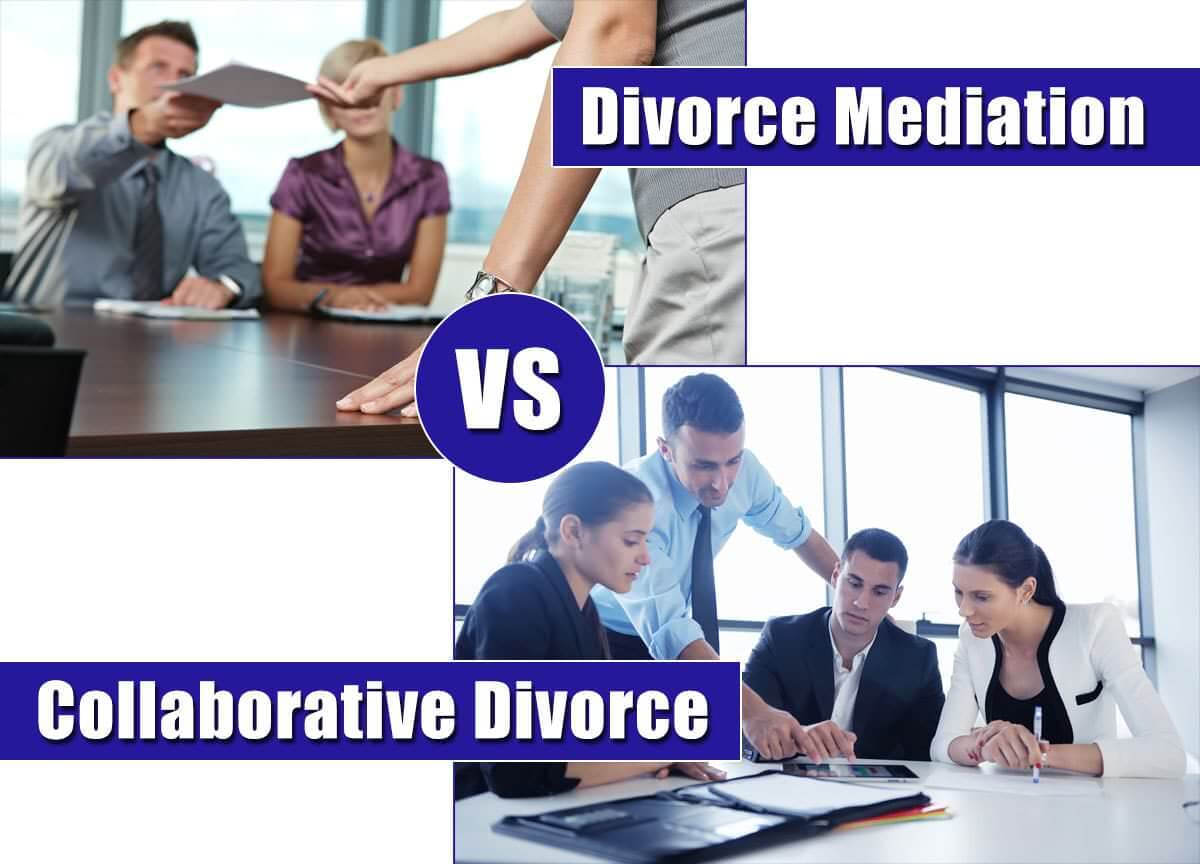Divorce Mediation Versus Collaborative Divorce
What’s the Difference between Divorce Mediation & Collaborative Divorce? Contact Us for a Free ConsultationCall 631-923-1910
A Long Island Divorce can be a very emotionally and financially draining time for you and your family. Divorces are infamous for costing families thousands of dollars and dragging on for what feels like eternity. By choosing a different method of divorce, such as Divorce Mediation or a Collaborative Divorce, you may be able to alleviate some of those stressors. Both alternative methods of divorce will save you and your family time, money and stress, as well as increasing the likelihood of a more cooperative relationship with your spouse moving forward.
Divorce Mediation
Divorce Mediation is an alternative to a Contested or Uncontested Divorce in which you and your spouse hire one neutral, third-party divorce mediator. Your divorce mediator will assist you and your spouse in reaching a Settlement Agreement and, ultimately, a Judgment of Divorce.
In a divorce mediation, you and your spouse will meet with your mediator and discuss your situation. The mediator will take notes and guide your discussion through the various points of contention of your divorce. You and your spouse can have any number of mediation sessions. The number depends purely upon how quickly you and your spouse reach an agreement. During the sessions, you will discuss all the common issues of your divorce, including property distribution, maintenance, child support and a custody and visitation agreement.
When you and your spouse have concluded your sessions with your mediator, he or she will draft a Stipulation of Settlement. This document will reflect the agreements that you and your spouse have reached as a result of your mediation. You will then both review and sign the agreement and the mediator will submit it to the court in your county. After the court receives your Stipulation, it will finalize your divorce.
If you and your spouse want to take advantage of the benefits of divorce mediation, you both must be willing to communicate with each other. You must have clear goals in mind, but also be willing to compromise. If you and your spouse cannot effectively communicate, divorce mediation will not work for you. It is critical that you both be able to hear each other, as your mediator cannot make decisions for you or give you legal advice. While this communication requirement may seem like a high burden, being able to effectively communicate with your spouse during your mediation has both short and long term benefits. In finalizing your divorce in an amicable way, it is very likely that you will have a better relationship with your spouse post-divorce. This relationship is especially important if you have children together. The ability to communicate as co-parents is a great benefit of divorce mediation.
Collaborative Divorce
A Collaborative Divorce is one in which both you and your spouse hire individual Collaborative Divorce Attorneys to represent each of you. Accordingly, your attorney will represent your interests and your spouse’s attorney will represent his or her interests. While this may look like a standard Contested Divorce with two attorneys fighting in court, in a Collaborative Divorce, the parties involved will all sign an agreement stating that no litigation will be commenced while a Settlement Agreement is being negotiated. This agreement states that you will all work cooperatively toward settlement, share all information that is necessary to reach a fair settlement, retain neutral experts as necessary to reach a fair settlement, and, finally, should a settlement not be reached, the attorneys will not be permitted to represent the parties in any subsequent court litigation. This is the mechanism by which you and your spouse are protected from attorneys attempting to force your matter into court to drive up legal fees. The agreement also encourages all parties involved to work toward common goals while reducing the likelihood of threats and/or ultimatums while negotiating.
The Collaborative Divorce process may sound similar to the stereotypical divorce, as both you and your spouse have retained attorneys. However, a Collaborative Divorce is a happy medium for couples who may not be able to effectively communicate on all issues pertaining to their divorce, but who still want to avoid time-consuming and expensive litigation. By utilizing two attorneys, you can ensure that your interests are being zealously represented without having to go to court as you would in a Contested or Uncontested Divorce.
As discussed above with Divorce Mediation, Collaborative Divorce fosters effective and amicable communication between you and your spouse. This ability to communicate is an invaluable skill when moving forward with your post-divorce life, especially if you have children together. The ability to co-parent and have productive communications with your spouse is incredibly important in providing stability to your children post-divorce.
Contact an Experienced Collaborative Divorce Attorney for Assistance
In order to effectuate either Divorce Mediation or a Collaborative Divorce, it is important that you have a Divorce Attorney with experience by your side to guide you through this intense period of change. If you think that you and your spouse would be good candidates for either process, please call us at 631-923-1910 to schedule your free consultation.
For more information, visit our Comprehensive Guide to Long Island Divorce Mediation.
SCHEDULE YOUR FREE CONSULTATION TODAY
Call 631-923-1910 or fill in the form below
Your attorney will describe the many options available and determine together which is the right solution for you. By the end of this conversation, we’ll all understand how we can best help you to move forward.
No Cost or Obligation
There is no cost or obligation for this initial consultation. It is simply an opportunity for us to get to know each other, answer your questions and learn if Hornberger Verbitsky, P.C. is the right law firm for you. Give us a call at 631-923-1910 or fill in the short form below for your free consultation and case evaluation.